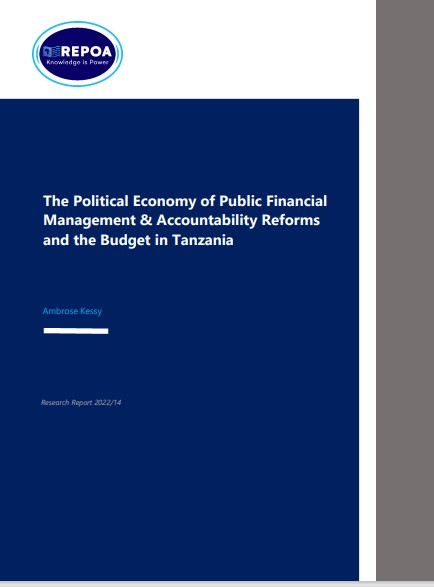Examining Funding Systems for Local Economic Development in Tanzania: A Key Component of Economic Structural Transformation

This study investigates the funding mechanisms that support Local Economic Development (LED) initiatives across seven regions in Tanzania: Kilimanjaro, Dar es Salaam, Mwanza, Kigoma, Iringa, Dodoma, and Mtwara. LED is recognized as a strategic approach to enhancing local economic capacities through decentralized governance, enabling local authorities to tailor initiatives to their communities’ specific needs. However, […]
The Political Economy of Public Financial Management & Accountability Reforms and the Budget in Tanzania

This research report examines the political economy in which informal power, political structures, and incentives influence public financial management and accountability (PFMA) reforms, the budget process, and public expenditure in Tanzania. READ ON…!
A better budget process in Tanzania: A strategy for Public Financial Management & Accountability
This policy brief examines the political economy in which informal power, political structures, and incentives influence public financial management and accountability (PFMA) reforms, the budget process, and public expenditure in Tanzania. A number of challenges face the current traditional revenue collection process in Tanzania and to underscore opportunities that can enhance revenue collection. Among the […]
Intergovernmental fiscal relations in Tanzania: Guidelines or directives?
The literature on political economy of decentralization underscores the importance of intergovernmental transfers as a vehicle for achieving national social, economic and political policy goals when administrative and financial powers are devolved to lower levels of government. Decentralization left without considering the capacity of authorities to raise enough resources and address needs will enhance inequity […]
Institutional and Legal Analysis of D-by-D in Tanzania: Rhetoric vs Reality
This policy brief highlights some key aspects of institutional and legal frameworks guiding the central-local relations in Tanzania Mainland. The past decades have seen a major set of initiatives by the central government to reform and modernize its local governments. Although there are specific policy and legal reforms, there has been a strong trend towards […]
Local Governance in Tanzania
Observations from Six Councils 2002-2003 Governance entails participation, transparency, efficiency, and equity in the management of people and their economy in a given country. Governance comprises the mechanisms, processes, and institutions, through which citizens and groups articulate their interests, exercise their legal rights, meet their obligations and mediate their differences. Local governance refers to the […]